宾语从句是一个句子在复合句中起宾语的作用
宾语从句是主从复合句的一种主从复合句是由一个主句和一
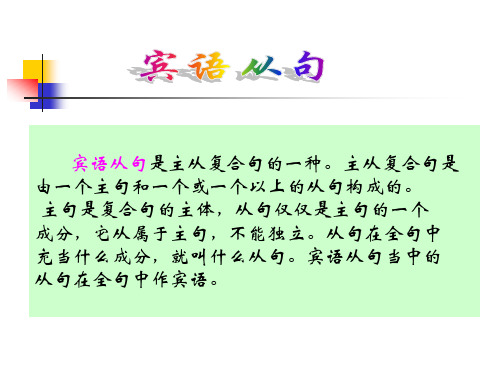
7) Jim doesn’t understand __B_____. A. which is the way to the museum B. why his wife always goes shopping C. what is the way to the museum D. why does she always go shopping
Example: ----Has Tom been here ? ----No. I don’t know if hewill come (come)here . ----I will call (call)you if he comes (come).
注意:
When表“当……时”时,是状语从句。
-- I’ll show you.
3 – I am not sure when / whether Tony will come or not.
-- No, he isn’t. 4 – I want to know how long / old
he is. -- He is ten years old.
→现在完成时Fra bibliotek→一般过去时
→
过去进行时 过去完成时 过去完成时
一般将来时
→
过去将来时
三、宾语从句注意事项
(一)当从句的原句为以下句子以及what, who作主语时,语序不变:
What’s wrong? What’s the matter? What’s happening? eg:I don’t know what’s the matter.
宾语从句结构及用法
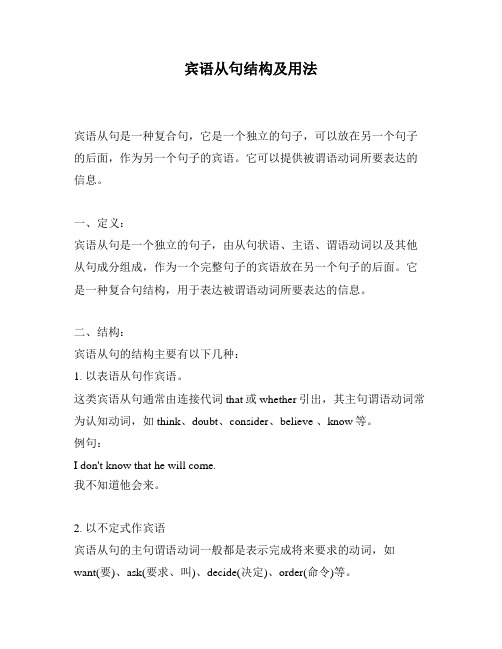
宾语从句结构及用法宾语从句是一种复合句,它是一个独立的句子,可以放在另一个句子的后面,作为另一个句子的宾语。
它可以提供被谓语动词所要表达的信息。
一、定义:宾语从句是一个独立的句子,由从句状语、主语、谓语动词以及其他从句成分组成,作为一个完整句子的宾语放在另一个句子的后面。
它是一种复合句结构,用于表达被谓语动词所要表达的信息。
二、结构:宾语从句的结构主要有以下几种:1. 以表语从句作宾语。
这类宾语从句通常由连接代词that或whether引出,其主句谓语动词常为认知动词,如think、doubt、consider、believe 、know等。
例句:I don't know that he will come.我不知道他会来。
2. 以不定式作宾语宾语从句的主句谓语动词一般都是表示完成将来要求的动词,如want(要)、ask(要求、叫)、decide(决定)、order(命令)等。
例句:He asked me to go there.他要求我去那儿。
3. 以动词不定式短语作宾语宾语从句的谓语动词一般是表示给予反馈的动词,如tell(告诉)、explain(解释)、show(显示)等。
例句:My teacher explained to us how to solve the problem.我的老师解释给我们如何解决这个问题。
4. 由从属连词who、which、that、whom等引导的宾语从句宾语从句的谓语动词常为行为动词,如see(看见)、hear(听见)、make(使)、find(发现)等。
例句:I heard that he was ill.我听说他病了。
三、用法:1、在宾语从句中,无论是什么类型的宾语从句,都应该将主句和宾语从句中的谓语动词时态保持一致。
2、介词后面也可以接宾语从句,主句的谓语动词一定是表示把某人或某物带到某处的意思的动词。
3、宾语从句紧跟在主句之后,而且:如果主句放在宾语从句之前,宾语从句中的从属连词要和主句已经具体指定的主语或宾语相一致。
在复合句中用作宾语的从句叫宾语从句
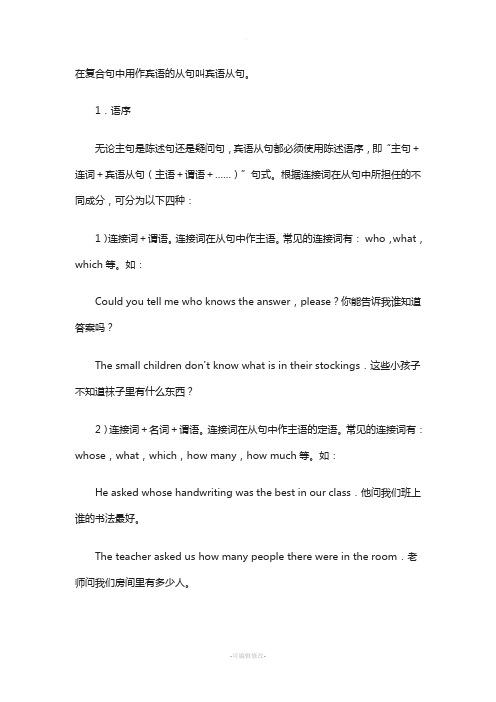
在复合句中用作宾语的从句叫宾语从句。
1.语序无论主句是陈述句还是疑问句,宾语从句都必须使用陈述语序,即“主句+连词+宾语从句(主语+谓语+……)”句式。
根据连接词在从句中所担任的不同成分,可分为以下四种:1)连接词+谓语。
连接词在从句中作主语。
常见的连接词有:who,what,which等。
如:Could you tell me who knows the answer,please?你能告诉我谁知道答案吗?The small children don't know what is in their stockings.这些小孩子不知道袜子里有什么东西?2)连接词+名词+谓语。
连接词在从句中作主语的定语。
常见的连接词有:whose,what,which,how many,how much等。
如:He asked whose handwriting was the best in our class.他问我们班上谁的书法最好。
The teacher asked us how many people there were in the room.老师问我们房间里有多少人。
3)连接词+主语+谓语。
连接词在从句中作宾语、状语或表语。
常见的连接词有:who(m),what,which,how many,how much,when,why,how,where,if /whether(在句中不充当任何成分)等。
如:He hasn't decided if he'll go on a trip to Wuxi.他还没决定是否去无锡旅行。
Could you tell me what I should do with the money ?你能告诉我我如何处理这笔钱吗?4)连接词+名词+主语+谓语。
连接词在从句中作宾语或表语的定语。
常见的连接词有:what,which,how many,how much,how等。
宾语从句的结构
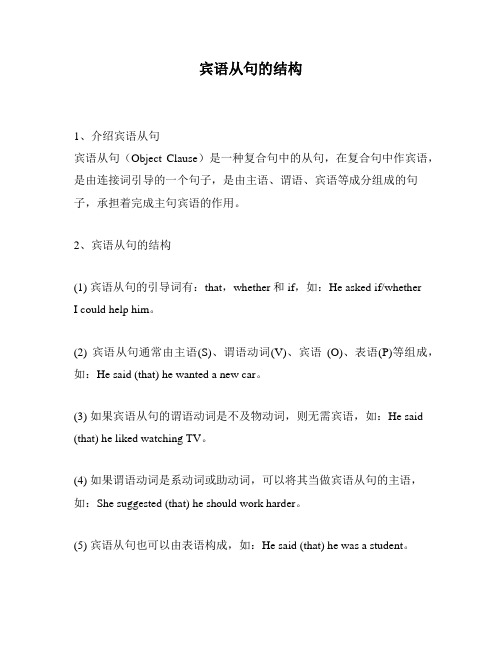
宾语从句的结构1、介绍宾语从句宾语从句(Object Clause)是一种复合句中的从句,在复合句中作宾语,是由连接词引导的一个句子,是由主语、谓语、宾语等成分组成的句子,承担着完成主句宾语的作用。
2、宾语从句的结构(1) 宾语从句的引导词有:that,whether 和 if,如:He asked if/whetherI could help him。
(2) 宾语从句通常由主语(S)、谓语动词(V)、宾语(O)、表语(P)等组成,如:He said (that) he wanted a new car。
(3) 如果宾语从句的谓语动词是不及物动词,则无需宾语,如:He said (that) he liked watching TV。
(4) 如果谓语动词是系动词或助动词,可以将其当做宾语从句的主语,如:She suggested (that) he should work harder。
(5) 宾语从句也可以由表语构成,如:He said (that) he was a student。
3、宾语从句的句型(1) 简单句及主谓结构:They said (that) they were ready. 他们说他们准备好了。
(2) 由否定词引导的宾语从句:They say (that) he isn’t satisfied with his job. 他们说他对他的工作不满意。
(3) 宾语从句中出现疑问词(what, when, where, why, who, whose, which):He asked me what I wanted. 他问我要什么。
(4) 由从属连词(when, while, before, after, as, since, until, if, unless, whether, though)引导的宾语从句:He wondered whether he should go. 他想知道他是否应该去。
宾语从句与宾语补足语
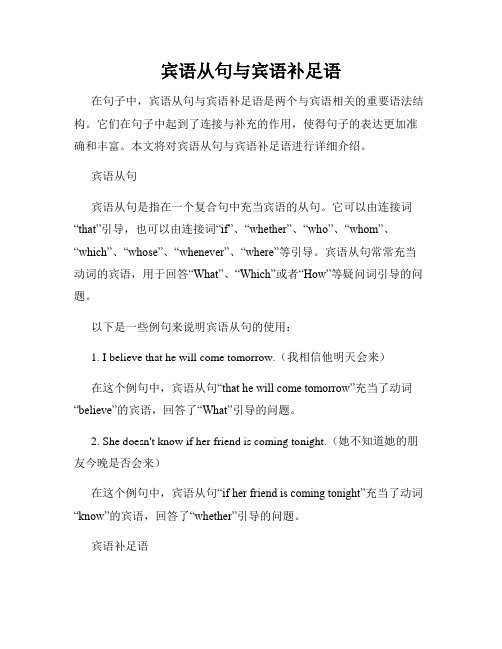
宾语从句与宾语补足语在句子中,宾语从句与宾语补足语是两个与宾语相关的重要语法结构。
它们在句子中起到了连接与补充的作用,使得句子的表达更加准确和丰富。
本文将对宾语从句与宾语补足语进行详细介绍。
宾语从句宾语从句是指在一个复合句中充当宾语的从句。
它可以由连接词“that”引导,也可以由连接词“if”、“whether”、“who”、“whom”、“which”、“whose”、“whenever”、“where”等引导。
宾语从句常常充当动词的宾语,用于回答“What”、“Which”或者“How”等疑问词引导的问题。
以下是一些例句来说明宾语从句的使用:1. I believe that he will come tomorrow.(我相信他明天会来)在这个例句中,宾语从句“that he will come tomorrow”充当了动词“believe”的宾语,回答了“What”引导的问题。
2. She doesn't know if her friend is coming tonight.(她不知道她的朋友今晚是否会来)在这个例句中,宾语从句“if her friend is coming tonight”充当了动词“know”的宾语,回答了“whether”引导的问题。
宾语补足语宾语补足语是指用来补充说明宾语或者对宾语进行修饰、补充的词、短语或从句。
宾语补足语通常用于及物动词后面,对动词的动作或状态进一步加以说明。
以下是一些例句来说明宾语补足语的使用:1. They made him their leader.(他们选他做他们的领导)在这个例句中,宾语补足语“their leader”进一步说明了他们对他的动作“made”的结果。
2. She considers him a talented musician.(她认为他是个有才华的音乐家)在这个例句中,宾语补足语“a talented musician”进一步说明了她对他的看法“considers”。
宾语从句顺序

宾语从句的概念宾语从句是一个句子(从句),在复合句中充当主句的宾语成分。
宾语从句由连接词引导,连接词通常有that, whether, if, where, when, why等等。
宾语从句可以出现在及物动词、及物形容词、及物名词后面。
宾语从句在句子中起到宾语的作用,常常用来作为对主语提出疑问、陈述观点、表达需求、描述情况等等。
宾语从句的例子以下是一些宾语从句的例子:1.She asked if I wanted to go with her to the movies.2.They wondered whether it would rain tomorrow.3.He believes that education is the key to success.4.She doesn’t know where her keys are.5.Can you tell me why he didn’t come to the meeting?宾语从句的引导词宾语从句的引导词包括that, whether, if, where, when, why等等。
下面是对这些引导词的简要说明:1.that:是最常用的宾语从句引导词,可用于陈述句和疑问句。
2.whether:用于陈述句和疑问句,可用于宾语从句中的任何位置。
3.if:与whether含义相同,但常用于条件句或感叹句中。
4.where:用于问地点的宾语从句。
5.when:用于问时间的宾语从句。
6.why:用于问原因的宾语从句。
这些引导词根据具体的语境和用法可以灵活替换,但要注意保持句子的语法正确性和语义合理性。
宾语从句的语序在宾语从句中,语序与陈述句保持一致。
对于陈述句来说,宾语从句的基本语序是主语 + 谓语 + 宾语,例如:•陈述句:He said, “I am busy.”•宾语从句:He said that he was busy.对于疑问句来说,宾语从句的语序是引导词 + 主语 + 谓语,例如:•疑问句:She asked, “Where is the library?”•宾语从句:She asked where the library was.宾语从句的时态宾语从句的时态通常相对于宾语从句的引导词来确定。
宾语从句-直接引语和间接引语

宾语从句1.宾语从句的概念:在复合句中,充当宾语的是个句子,或者说句子作宾语。
2.位置:动宾,介宾3.句子结构:主句 +连词(引导词)+ 宾语从句宾语从句的引导词:一、当宾语从句是述句时(包括肯定句和否定句),连词由that引导,因为that 在从句中不作任何成分,也没有任何具体意思,因此在口语或非正式文体中常省略。
例:1.Lin Tao feels (that) his own team is even better.2.Jim thought (that) the train was like a big moving party.二、在主句为动词be加某些形容词,如sorry, sure, afraid, glad……作表语时(be+a.看作是一个动词词组),后面所跟从句也是宾语从句。
例:1.I’m sorry (that) I don’t know .2.We’re sure (that) our team will win .注:that 在句中无词汇意义,在从句中不能充当成分,在口语当中往往省略。
三、当宾语从句是一般疑问句时,由连词whether或if引导(口语中常用if),if/whether 虽然不作成分,但是译为:“是否”,所以不能省略。
例:1.Lily wanted to know (if /whether) her grandma liked the handbag .2.Let’s see (if /whether) we can find out some information about that city . 注:1.当句中有or 或者or not时,引导词只能用whether而不能用if.2.在介词后面,引导词只能用whether而不能用if.3.在动词不定式前,引导词只能用whether而不能用if.四、当宾语从句是特殊疑问句时,由连接代词(what, who, whom, which, whose)或连接副词(when, where, why,how, how many, how old, how long,……, )引导,每个连接词在从句中都担任一定的句子成分,意思各不相同,所以不可以省略。
宾语从句
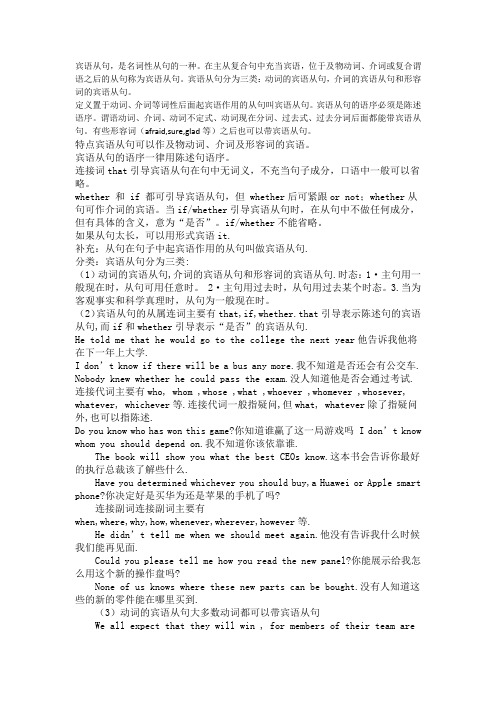
宾语从句,是名词性从句的一种。
在主从复合句中充当宾语,位于及物动词、介词或复合谓语之后的从句称为宾语从句。
宾语从句分为三类:动词的宾语从句,介词的宾语从句和形容词的宾语从句。
定义置于动词、介词等词性后面起宾语作用的从句叫宾语从句。
宾语从句的语序必须是陈述语序。
谓语动词、介词、动词不定式、动词现在分词、过去式、过去分词后面都能带宾语从句。
有些形容词(afraid,sure,glad等)之后也可以带宾语从句。
特点宾语从句可以作及物动词、介词及形容词的宾语。
宾语从句的语序一律用陈述句语序。
连接词that引导宾语从句在句中无词义,不充当句子成分,口语中一般可以省略。
whether 和 if 都可引导宾语从句,但 whether后可紧跟or not;whether从句可作介词的宾语。
当if/whether引导宾语从句时,在从句中不做任何成分,但有具体的含义,意为“是否”。
if/whether不能省略。
如果从句太长,可以用形式宾语it.补充:从句在句子中起宾语作用的从句叫做宾语从句.分类:宾语从句分为三类:(1)动词的宾语从句,介词的宾语从句和形容词的宾语从句.时态:1·主句用一般现在时,从句可用任意时。
2·主句用过去时,从句用过去某个时态。
3.当为客观事实和科学真理时,从句为一般现在时。
(2)宾语从句的从属连词主要有that,if,whether.that引导表示陈述句的宾语从句,而if和whether引导表示“是否”的宾语从句.He told me that he would go to the college the next year他告诉我他将在下一年上大学.I don’t know if there will be a bus any more.我不知道是否还会有公交车. Nobody knew whether he could pass the exam.没人知道他是否会通过考试. 连接代词主要有who, whom ,whose ,what ,whoever ,whomever ,whosever, whatever, whichever等.连接代词一般指疑问,但what, whatever除了指疑问外,也可以指陈述.Do you know who has won this game?你知道谁赢了这一局游戏吗I don’t know whom you should depend on.我不知道你该依靠谁.The book will show you what the best CEOs know.这本书会告诉你最好的执行总裁该了解些什么.Have you determined whichever you should buy,a Huawei or Apple smart phone?你决定好是买华为还是苹果的手机了吗?连接副词连接副词主要有when,where,why,how,whenever,wherever,however等.He didn’t tell me when we should meet again.他没有告诉我什么时候我们能再见面.Could you please tell me how you read the new panel?你能展示给我怎么用这个新的操作盘吗?None of us knows where these new parts can be bought.没有人知道这些的新的零件能在哪里买到.(3)动词的宾语从句大多数动词都可以带宾语从句We all expect that they will win , for members of their team arestronger.我们都预料他们会赢,因为他们的队员更强壮.He told us that they would help us through the whole work.他告诉我们在整个工作中,他都会帮忙的.部分“动词+副词”结构也可以带宾语从句I have found out that all the tickets for the concert have been sold out.我发现这场音乐会的所有票都卖光了.Can you work out how much we will spend during the trip?你能计算出这次旅行我们将花费多少钱吗?动词短语也可以带宾语从句常见的这些词有:make sure确保 keep in mind 牢记Make sure that there are no mistakes in your papers before you turn them in.在上交试卷前确保没有任何错误.可运用形式宾语it代替的宾语从句①动词find,feel,consider,make,believe等后面有宾语补足语的时候,则需要用it做形式宾语而将that宾语从句后置.I think it necessary that we take plenty of hot water every day .我认为每天多喝开水是有必要的.I feel it a pity that I haven’t been t o the get-together.我没去聚会,感觉非常遗憾.I have made it a rule that I keep diaries. 我每天写日记成了习惯.We all find it important that we (should) make a quick decision about this mater. 我们都认为对这件事马上做出决定很重要.②有些动词带宾语从句时需要在宾语与从句前加it这类动词主要有:hate, take , owe, have, see to.I hate it when they talk with their mouths full of food.我讨厌他们满嘴食物时说话.(when引导时间状语从句,it是代词,代指这种情况) I hate it that i love you.我讨厌我爱你。
宾语从句的简单句句式

宾语从句的简单句句式
宾语从句是主从复合句的一种,在句子中起宾语作用。
以下是宾语从句的一些简单句式:
1. We believe that he is honest.(我们相信他是诚实的。
)
2. The doctor insists that I give up smoking.(医生坚持要我戒烟。
)
3. They proved that he was innocent.(他们证明他是无辜的。
)
4. She suggested that we should leave early.(她建议我们早点离开。
)
5. I think it necessary that we take plenty of water every day.(我认为我们每天多喝水是必要的。
)
6. The teacher told us that the earth goes around the sun.(老师告诉我们地球绕着太阳转。
)
这些句子中,that 引导的宾语从句用来表示陈述语气,即从句所表达的是一个事实或陈述。
需要注意的是,在使用宾语从句时,从句的语序应该是陈述句语序,即连接词+主语+谓语+其它成分。
除了 that 引导的宾语从句,还有其他连接词可以引导宾语从句,如 whether, if, what, when, where, why, how 等。
这些连接词根据其在从句中的作用不同,分别表示是否、疑问、时间、地点、原因、方式等。
希望这些简单的句式能够帮助你理解和使用宾语从句。
如果你需要更多关于宾语从句的信息,可以查阅相关的语法书籍或参考更多的例句。
浅谈高中宾语从句的教学方法
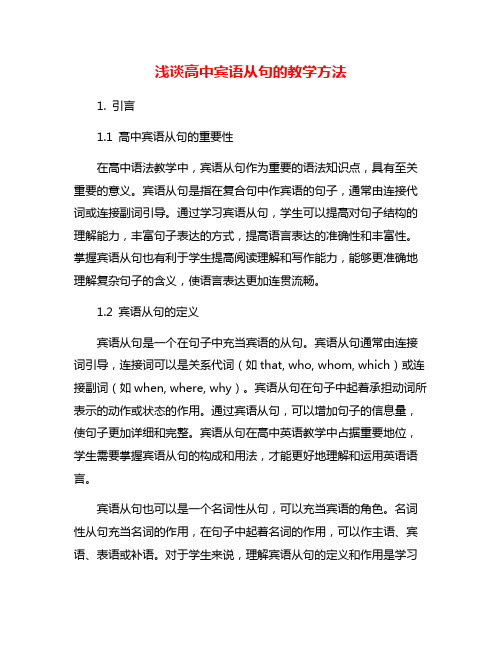
浅谈高中宾语从句的教学方法1. 引言1.1 高中宾语从句的重要性在高中语法教学中,宾语从句作为重要的语法知识点,具有至关重要的意义。
宾语从句是指在复合句中作宾语的句子,通常由连接代词或连接副词引导。
通过学习宾语从句,学生可以提高对句子结构的理解能力,丰富句子表达的方式,提高语言表达的准确性和丰富性。
掌握宾语从句也有利于学生提高阅读理解和写作能力,能够更准确地理解复杂句子的含义,使语言表达更加连贯流畅。
1.2 宾语从句的定义宾语从句是一个在句子中充当宾语的从句。
宾语从句通常由连接词引导,连接词可以是关系代词(如that, who, whom, which)或连接副词(如when, where, why)。
宾语从句在句子中起着承担动词所表示的动作或状态的作用。
通过宾语从句,可以增加句子的信息量,使句子更加详细和完整。
宾语从句在高中英语教学中占据重要地位,学生需要掌握宾语从句的构成和用法,才能更好地理解和运用英语语言。
宾语从句也可以是一个名词性从句,可以充当宾语的角色。
名词性从句充当名词的作用,在句子中起着名词的作用,可以作主语、宾语、表语或补语。
对于学生来说,理解宾语从句的定义和作用是学习英语语言和提高语言能力的关键。
在教学中,引导学生理解和掌握宾语从句的用法和特点,是提高学生英语综合能力的重要一环。
2. 正文2.1 如何引导学生学习宾语从句引导学生学习宾语从句是高中英语教学中的重要环节,下面将介绍几种有效的方法:教师应该以简单易懂的语言解释宾语从句的定义和用法,引导学生理解宾语从句在句子中的作用和结构。
可以通过举例说明,让学生感受宾语从句的实际运用,帮助他们建立起对宾语从句的认识。
教师可以通过阅读理解、听力练习等方式让学生接触大量含有宾语从句的语言材料,帮助他们熟悉宾语从句的使用环境和语境。
教师可以设计一些实际情景的练习,让学生在语境中体会宾语从句的运用,提升他们的实际应用能力。
教师还可以借助互动式教学方法,让学生在轮流练习中主动参与,提高他们对宾语从句的掌握程度。
宾语从句用法详解
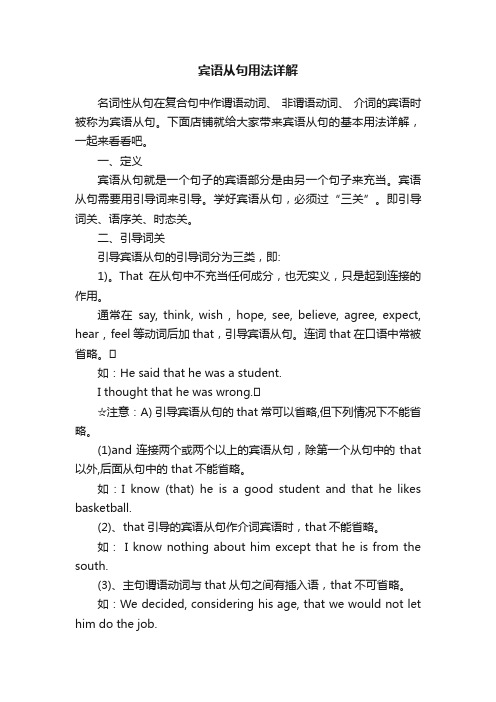
宾语从句用法详解名词性从句在复合句中作谓语动词、非谓语动词、介词的宾语时被称为宾语从句。
下面店铺就给大家带来宾语从句的基本用法详解,一起来看看吧。
一、定义宾语从句就是一个句子的宾语部分是由另一个句子来充当。
宾语从句需要用引导词来引导。
学好宾语从句,必须过“三关”。
即引导词关、语序关、时态关。
二、引导词关引导宾语从句的引导词分为三类,即:1)。
That在从句中不充当任何成分,也无实义,只是起到连接的作用。
通常在say, think, wish , hope, see, believe, agree, expect, hear , feel等动词后加that,引导宾语从句。
连词that在口语中常被省略。
如:He said that he was a student.I thought that he was wrong.☆注意:A) 引导宾语从句的that 常可以省略,但下列情况下不能省略。
(1)and连接两个或两个以上的宾语从句,除第一个从句中的that 以外,后面从句中的 that不能省略。
如:I know (that) he is a good student and that he likes basketball.(2)、that引导的宾语从句作介词宾语时,that不能省略。
如: I know nothing about him except that he is from the south.(3)、主句谓语动词与that从句之间有插入语,that不可省略。
如:We decided, considering his age, that we would not let him do the job.B) 常这样用的动词有find,feel,consider,make,believe 等。
如:He doesn’t want it to be known that he is going away.C) think, believe, imagine, suppose, consider, expect, fancy,guess等表示主观看法或认识的动词,.如:I don’t think he will come to my party.(而不能说成I think he won’t come to my party.) I don’t believe that he is a good student, is he? 我认为他不是个好学生,不是吗? I don’t think you are right.I don’t believe that they have finished their work.比较:she believes that I am not a good student.2)常可以互换。
宾语从句和定语从句的区别

宾语从句和定语从句的区别最简单的方法就是把从句去掉。
如果句子结构依然成立,那么从句就是定语从句。
如果句子缺少成份了,那么就是宾语从句了。
另外,就位置来说,宾语从句一定放在及物动词或介词后面,要特别注意带形式宾语It的情况。
定语从句一定在名词后面。
至于那些关联词,我的方法是分类记忆。
that,Which属于定从的关系代词,在从句中充当一定成分,指代先行词;when,Why属于关系副词,无论定从还是宾从都不充当任何成分。
what是宾从中的关系代词,充当成分。
that还有一个作用就是宾从的关系副词,不充当任何成分。
一、位置的不同:宾语位于及物动词或介词后面;定语从句位于名词后修饰名词;二、引导词的不同:宾语从句引导词有三种:连词,连接代词,连接副词;而定语从句引导词有两种:关系代词,关系副词。
三、意义的不同:宾语从句是宾语,句子中的不可缺少的成分,不能用逗号与句子隔开;定语从句是修饰用的,可以用逗号与句子隔开,成为非限制性定语从句。
二、一、位置的不同:宾语位于及物动词或介词后面;定语从句位于名词后修饰名词;二、引导词的不同:宾语从句引导词有三种:连词,连接代词,连接副词;而定语从句引导词有两种:关系代词,关系副词。
三、意义的不同:宾语从句是宾语,句子中的不可缺少的成分,不能用逗号与句子隔开;定语从句是修饰用的,可以用逗号与句子隔开,成为非限制性定语从句。
宾语从句(一)宾语从句在复合句中作主句的宾语。
宾语从句常由that引导,在口语中常省略。
当主句中谓语动词是现在或将来时态时,从句中谓语动词不受主句中谓语动词时态的影响,按需要可以使用任何时态。
如:She says (that) she works from Monday to Friday. 她说她从周一至周五上班。
(从句是一般现在时)She says (that) she will leave a message on his desk. 她说她要在他桌子上留个便条。
宾语从句

=Mr Li told us (that) the moon moves around the
earth
1.以that引导的宾语从句 陈述句变宾语从句用 引导 以 引导的宾语从句. 变宾语从句用that引导 引导的宾语从句 陈述句变宾语从句用 引导.
宾语从句的语序: 二. 宾语从句的语序 宾语从句一般由“引导词(连接词) 主语+谓语+ 宾语从句一般由“引导词(连接词)+主语+谓语+ 其它”构成, 语序是陈述句语序 陈述句语序。 其它”构成,其语序是陈述句语序。 Eg:May we ask what you are doing? : Where does he live? I don’t know. = I don’t know where he lives.
注:当从句的原句为以下句子,语序不变: 当从句的原句为以下句子,语序不变:
What’s wrong? What’s the matter? What’s happening? What happened? Eg: I don’t know what’s the matter.
宾语从句的时态: 三. 宾语从句的时态 主句时态 现在时/将来时 现在时 将来时 过去时 从句时态 相应任何时态 相应过去任何时态 相应过去任何时态
= I don’t know when they left.
5). Where will we have the party? Please tell us.
= Please tell us where we will have the party.
that——不能省略的3种情况 that——不能省略的3种情况 不能省略的
宾语从句讲解(全)
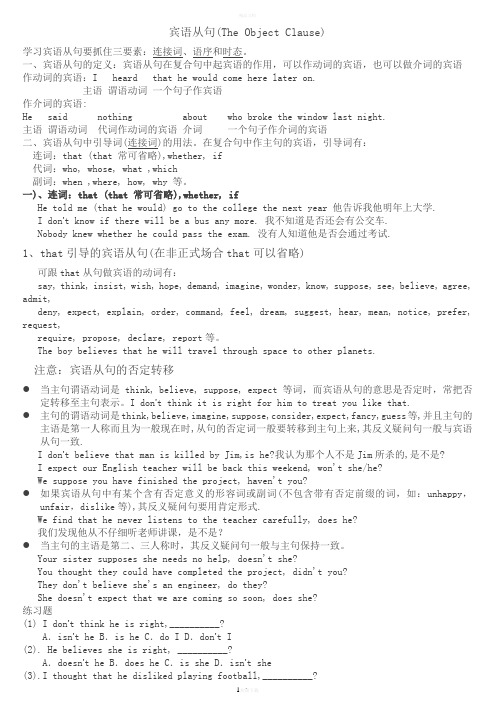
宾语从句(The Object Clause)学习宾语从句要抓住三要素:连接词、语序和时态。
一、宾语从句的定义:宾语从句在复合句中起宾语的作用,可以作动词的宾语,也可以做介词的宾语作动词的宾语:I heard that he would come here later on.主语谓语动词一个句子作宾语作介词的宾语:He said nothing about who broke the window last night.主语谓语动词代词作动词的宾语介词一个句子作介词的宾语二、宾语从句中引导词(连接词)的用法。
在复合句中作主句的宾语,引导词有:连词:that (that 常可省略),whether, if代词:who, whose, what ,which副词:when ,where, how, why 等。
一)、连词:that (that 常可省略),whether, ifHe told me (that he would) go to the college the next year 他告诉我他明年上大学.I don’t know if there will be a bus any more. 我不知道是否还会有公交车.Nobody knew whether he could pass the exam. 没有人知道他是否会通过考试.1、that引导的宾语从句(在非正式场合that可以省略)可跟that从句做宾语的动词有:say, think, insist, wish, hope, demand, imagine, wonder, know, suppose, see, believe, agree, admit,deny, expect, explain, order, command, feel, dream, suggest, hear, mean, notice, prefer, request,require, propose, declare, report等。
宾语从句全解
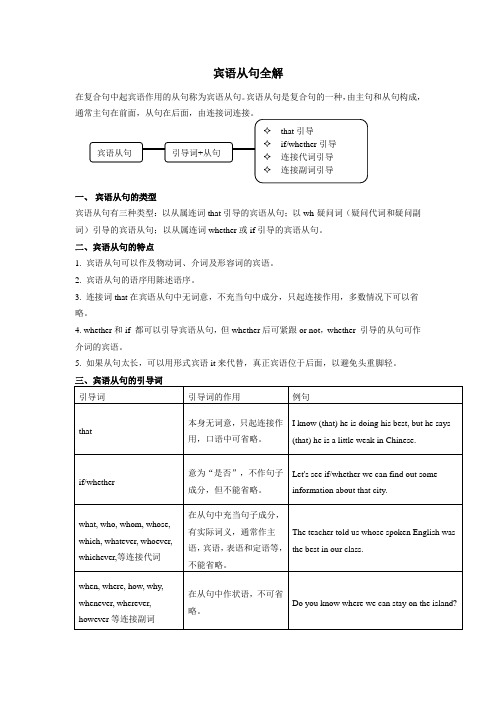
宾语从句全解在复合句中起宾语作用的从句称为宾语从句。
宾语从句是复合句的一种,由主句和从句构成,通常主句在前面,从句在后面,由连接词连接。
一、宾语从句的类型宾语从句有三种类型:以从属连词that引导的宾语从句;以wh-疑问词(疑问代词和疑问副词)引导的宾语从句;以从属连词whether或if引导的宾语从句。
二、宾语从句的特点1. 宾语从句可以作及物动词、介词及形容词的宾语。
2. 宾语从句的语序用陈述语序。
3. 连接词that在宾语从句中无词意,不充当句中成分,只起连接作用,多数情况下可以省略。
4. whether和if 都可以引导宾语从句,但whether后可紧跟or not,whether 引导的从句可作介词的宾语。
5. 如果从句太长,可以用形式宾语it来代替,真正宾语位于后面,以避免头重脚轻。
三、宾语从句的引导词引导词引导词的作用例句that 本身无词意,只起连接作用,口语中可省略。
I know (that) he is doing his best, but he says(that) he is a little weak in Chinese.if/whether 意为“是否”,不作句子成分,但不能省略。
Let's see if/whether we can find out someinformation about that city.what, who, whom, whose, which, whatever, whoever, whichever,等连接代词在从句中充当句子成分,有实际词义,通常作主语,宾语,表语和定语等,不能省略。
The teacher told us whose spoken English wasthe best in our class.when, where, how, why, whenever, wherever, however等连接副词在从句中作状语,不可省略。
宾语从句的句子结构讲解
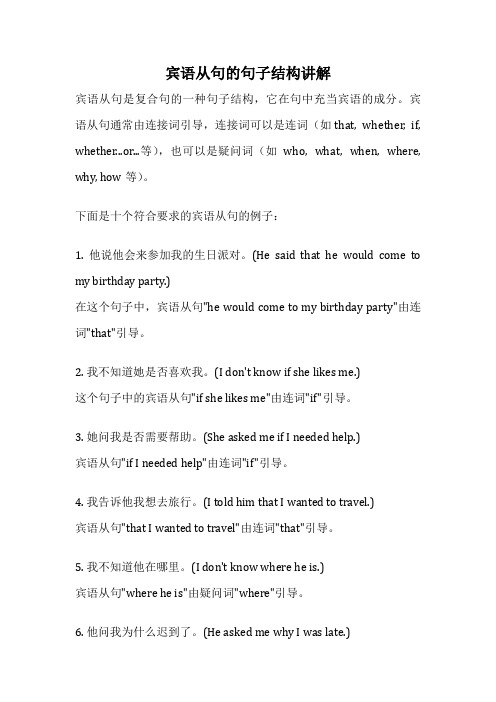
宾语从句的句子结构讲解宾语从句是复合句的一种句子结构,它在句中充当宾语的成分。
宾语从句通常由连接词引导,连接词可以是连词(如that, whether, if, whether...or...等),也可以是疑问词(如who, what, when, where, why, how等)。
下面是十个符合要求的宾语从句的例子:1. 他说他会来参加我的生日派对。
(He said that he would come to my birthday party.)在这个句子中,宾语从句"he would come to my birthday party"由连词"that"引导。
2. 我不知道她是否喜欢我。
(I don't know if she likes me.)这个句子中的宾语从句"if she likes me"由连词"if"引导。
3. 她问我是否需要帮助。
(She asked me if I needed help.)宾语从句"if I needed help"由连词"if"引导。
4. 我告诉他我想去旅行。
(I told him that I wanted to travel.)宾语从句"that I wanted to travel"由连词"that"引导。
5. 我不知道他在哪里。
(I don't know where he is.)宾语从句"where he is"由疑问词"where"引导。
6. 他问我为什么迟到了。
(He asked me why I was late.)宾语从句"why I was late"由疑问词"why"引导。
7. 我不确定是否应该接受邀请。
宾语从句用法全解

宾语从句用法全解一、宾语从句概述在复合句中,由一个句子充当宾语,这个句子就叫宾语从句。
宾语通常有动词宾语、介词宾语和形容词宾语,所以宾语从句分为:动词的宾语从句、介词的宾语从句和形容词的宾语从句这三种类型。
1.及物动词的宾语从句We know that Trump is the former president of America.I don’t really care if my friends are the same as me or different.2. 介词的宾语从句We’re interested in what she is doing.We should think about how we can do better next time.We are curious about whether he will continue to be the president of America.3. 部分形容词的宾语从句I’m sure that we will win the game.He was really worried that his coach might kick him off the team.I’m so glad that I canceled my plan to go to the market.I am afraid that he will lose the election.二、賓语从句的连接词1. 连接词that当宾语从句是陈述句时,用连接词that引导,that无意义,不作成分,在口语或非正式文体中常省略that。
I hear (that)he will be back in a month.Many think (that)sharks are too strong to be endangered.Mary told me (that)she would go shopping the next day.注意:that在宾语从句中可省略,但在两个或两个以上的并列宾语从句中,从第二个that起,不能省略。
宾语从句与主语从句的对比与运用

宾语从句与主语从句的对比与运用宾语从句和主语从句是复合句的两种重要成分,它们在句子中具有不同的语法功能。
本文将对宾语从句和主语从句进行对比,并探讨它们在实际运用中的不同用法。
一、宾语从句的定义与特点宾语从句是由一个词、一个词组或一个从句构成的,充当主句中的宾语。
宾语从句通常由连接词“that”引导,也可以使用其他引导词,如“whether/if”等。
宾语从句可以出现在及物动词的宾语位置或介词后面。
例如:1. She said that she would come to the party.(宾语从句作说的内容)2. I wonder if it will rain tomorrow.(宾语从句作wonder的内容)3. He asked me whether I had finished the report.(宾语从句作ask的内容)宾语从句的特点是:1. 通常由连接词引导;2. 可以作及物动词的宾语位置或介词后面的宾语。
二、主语从句的定义与特点主语从句是一个从句充当主句的主语,它引导整个句子的核心。
常见的主语从句引导词有“that、whether/if、who、what、which”等。
例如:1. What he said is true.(主语从句作主语)2. Whether they will attend the meeting is still uncertain.(主语从句作主语)主语从句的特点是:1. 通常由连接词引导;2. 充当整个句子的主语。
三、宾语从句与主语从句的对比1. 句子成分:宾语从句作为整个句子的宾语,而主语从句则是整个句子的主语。
2. 引导词:宾语从句通常由连接词“that、whether/if”等引导,而主语从句则可以由多种引导词引导。
3. 位置:宾语从句通常出现在及物动词的宾语位置或介词后面,而主语从句则位于句首作为主语。
4. 语序:宾语从句的语序与陈述句语序相同,而主语从句的语序也与陈述句语序相同。
句子中什么是宾语从句
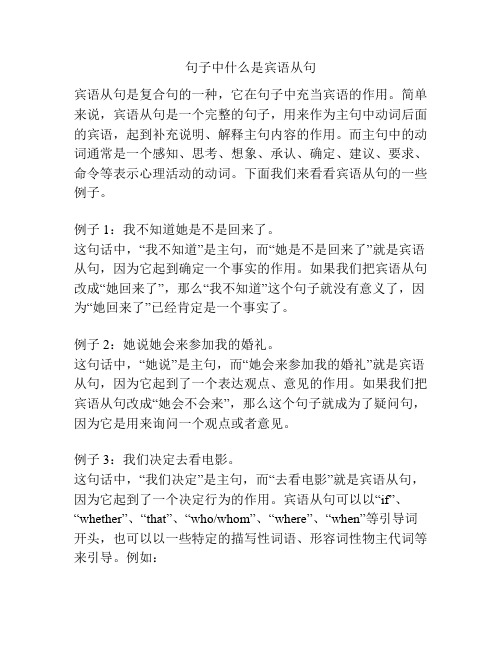
句子中什么是宾语从句宾语从句是复合句的一种,它在句子中充当宾语的作用。
简单来说,宾语从句是一个完整的句子,用来作为主句中动词后面的宾语,起到补充说明、解释主句内容的作用。
而主句中的动词通常是一个感知、思考、想象、承认、确定、建议、要求、命令等表示心理活动的动词。
下面我们来看看宾语从句的一些例子。
例子1:我不知道她是不是回来了。
这句话中,“我不知道”是主句,而“她是不是回来了”就是宾语从句,因为它起到确定一个事实的作用。
如果我们把宾语从句改成“她回来了”,那么“我不知道”这个句子就没有意义了,因为“她回来了”已经肯定是一个事实了。
例子2:她说她会来参加我的婚礼。
这句话中,“她说”是主句,而“她会来参加我的婚礼”就是宾语从句,因为它起到了一个表达观点、意见的作用。
如果我们把宾语从句改成“她会不会来”,那么这个句子就成为了疑问句,因为它是用来询问一个观点或者意见。
例子3:我们决定去看电影。
这句话中,“我们决定”是主句,而“去看电影”就是宾语从句,因为它起到了一个决定行为的作用。
宾语从句可以以“if”、“whether”、“that”、“who/whom”、“where”、“when”等引导词开头,也可以以一些特定的描写性词语、形容词性物主代词等来引导。
例如:1.“I asked whether/ if he is coming to the party.”2.“I’m sure that he will pass the exam.”3.“I don’t know who/ whom will come to the meeting.”4.“Can you tell me where she lives?”总的来说,宾语从句在复合句中扮演着很重要的角色。
在日常生活中,我们需要通过掌握语法规则,加强对句子结构的理解,才能更好地运用宾语从句来表达我们的意思。
同时,我们也需要注意不同语言之间的表达方式差异,例如中英文之间的表达方式不同,需要在学习语言的过程中加以注意和区分。
- 1、下载文档前请自行甄别文档内容的完整性,平台不提供额外的编辑、内容补充、找答案等附加服务。
- 2、"仅部分预览"的文档,不可在线预览部分如存在完整性等问题,可反馈申请退款(可完整预览的文档不适用该条件!)。
- 3、如文档侵犯您的权益,请联系客服反馈,我们会尽快为您处理(人工客服工作时间:9:00-18:30)。
宾语从句是一个句子在复合句中起宾语的作用,它既可作谓语的宾语,也可作介词的宾语。
宾语从句由从属连词that,if,whether,连接代词who,whom,whose,what,which或连接副词when,where,h ow,why引导。
(1)宾语从句的引导词
①陈述意义的宾语从句由从属连词that引导,that本身没有词义,引导词在从句中不担任从句中的句子成分,在口语或非正式文体中常省略。
例如:
He said(that)you were a good girl.他说你是一个好女孩。
I hope(that)he will come tomorrow.我希望他明天能来。
当that引导几个并列关系的宾语从句时,最后一个that不可省略。
例如:
Yang Ming said(that)the book was very interesting and that he enjoyed it very much.杨明说那本书很有趣他非常喜欢看。
②表示一般疑问意义的宾语从句由从属连词if或whether引导。
引导词在从句中不担任从句中的句子成分。
如果强调“究竟……还是……”时,只能在whether后加not。
例如:She wants to know if her uncle likes the new shirt.
I don't know whether this coat is yours or not.我不知道这件外套究竟是不是你的。
③表示特殊疑问意义的宾语从句由连接代词who,whom,whose,what,which或连接副词when,where,how,why引导。
引导词在从句中担任从句中的某个成分。
宾语从句的语序要用陈述语序。
例如:
The small children don't know who Father Christmas is.
—We never know what he is.
—They say he is a doctor.
I asked him which one he liked best.
Could you tell me why you were late for the meeting this morning?
(2)宾语从句的语序
①宾语从句中,从句部分要用陈述语序。
特别要注意的是,将疑问句变为宾语从句时,要将从句中的情态动词、连系动词be、助动词will,have,be等移至主语之后,将宾语从句部分变为陈述语序。
例如:
Have you decided when you will leave Canada?
Excuse me,sir.Could you tell me where I can find the toilet,please?
Do you know what the population of Chongqing is?
②如果疑问句中的助动词是do,does,did,变为宾语从句时,要将助动词do,does,did去掉,将从句中的动词变为其相应的时态。
例如:
I don't know where Mr.Brown lives.
He didn't tell me which floor he livedon.
(3)宾语从句中的时态呼应
①若主句是一般现在时或一般将来时,可根据句子意义使用所需要的各种时态。
例如:Nobody knows where he lives.
Can you see what he's reading?
Do you still remember what he said?
—When will you fly to Sydney?
—Pardon?
—I ask you when you will fly to Sydney.
②如主句是一般过去时,宾语从句的动词要用过去的某种时态。
例如:
He asked me where I had been during the winter holidays.
Did you hear what he said clearly?
He wanted to know why she got up late.
③如果主句叙述的是自然现象、客观真理,其从句的时态不受主句的限制,要用一般现在时。
例如:
Could you tell me where she lives now?
Could you tell me how far it is from your house to the factory?
The teacher said the earth goes around the sun.
(4)宾语从句中的否定转移问题
在宾语从句中,主句的谓语动词是think,believe等词时、主句的主语是第一人称时,从句的否定要转移到主句上去。
例如:
We don't think he will come.我们认为他不会来了。
I don't think you'll like it,will you?我想你不喜欢它,对吗?
(5)宾语从句转化为简单句
①宾语从句可转化为不定式或“疑问词+不定式”结构,变为简单句。
例如:
I don't know when we shall leave for Nanjing.(改为简单句)
→I don't know when _________ _________ for Nanjing.(答案:to;leave)
I don't know how I can keep my room clean.(改写句子)
→I don't know how _________ _________ my room clean.(答案:to;keep)
②宾语从句可以转化为复合宾语结构,变为简单句。
例如:
We found that he was a clever boy.(改写句子)
→We found _________ very _________ .(答案:him;clever)
Tom's mother saw that he was sitting on some eggs.(改写句子)
→Tom's mother saw _________ _________ on some eggs.(答案:him;sitting)
(6)宾语从句的复合结构
在有些动词find,make,think后跟复合宾语时,为了避免句子结构复杂混乱,常用it作形式宾语,而将that从句放在宾语补足语之后,其结构是:“动词(find,make,think等)+it+宾语补足语+that从句”。
例如:
We think it important that we learn a foreign language well.我们认为学好一门外语是非常重要的。
